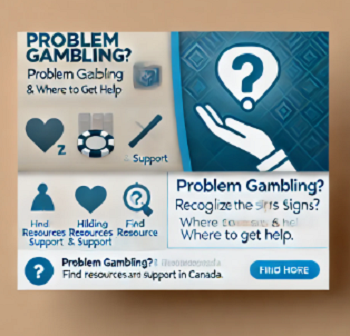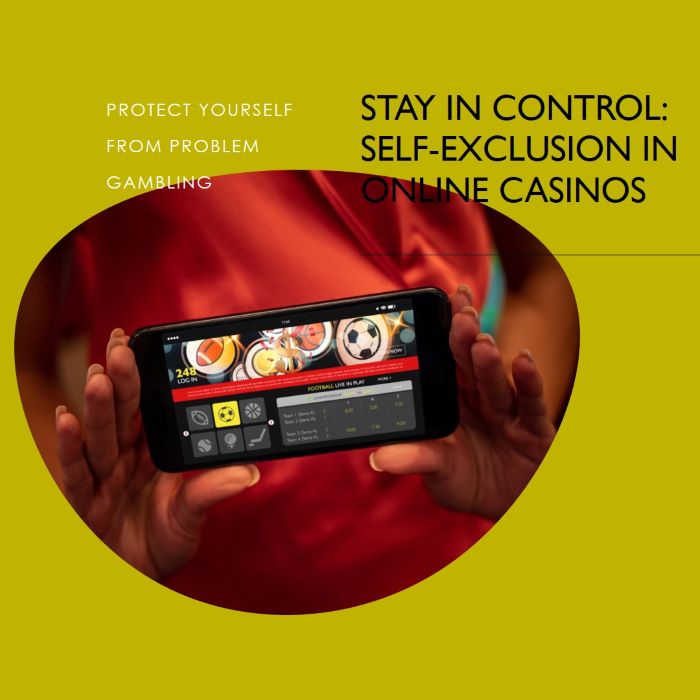Recognizing the Signs of Problem Gambling and Where to Get Help (CA)

Why Recognizing Problem Gambling Matters
Gambling can be a fun, exciting way to pass the time, but for some, it can turn into a serious issue. When gambling starts to interfere with one’s life, work, or relationships, it’s important to recognize the signs early. This guide will help you identify the common warning signs of problem gambling and provide information on resources available in Canada to get support and regain control.
🚩 1. What is Problem Gambling?
📉 Understanding the Shift from Entertainment to Problem Behavior
Problem gambling occurs when gambling moves beyond entertainment and begins to negatively impact one’s life. This shift often happens gradually, sometimes without the person realizing it. At first, gambling might be a fun escape or a social activity, but as it becomes more frequent, it can turn into a dependency.
🔍 Who is at Risk?
Anyone can be at risk of developing gambling problems, but certain factors increase vulnerability. People who experience high stress, have mental health issues, or a family history of addiction may be more susceptible. In Canada, about 1 in 50 adults is affected by gambling-related problems, showing that this is a common issue that can affect anyone, regardless of background.
💡 2. Common Signs of Problem Gambling
💸 Financial Warning Signs
Financial difficulties are one of the most common indicators of problem gambling. Here are some signs to watch for:
- Overspending: Gambling more money than initially intended or betting beyond one’s means.
- Debt Accumulation: Taking out loans, borrowing from friends or family, or even selling personal items to fund gambling.
- Chasing Losses: Increasing bets to try to “win back” money lost, which often leads to even bigger losses.
If you notice any of these behaviors, it could be a sign that gambling is creating a financial burden.
🕰️ Behavioral Warning Signs
Problem gambling often changes a person’s behavior, leading to:
- Longer Sessions: Spending more time gambling than intended, often for hours at a time.
- Secrecy and Lies: Hiding gambling activity from loved ones or lying about the amount of time and money spent on gambling.
- Loss of Control: Feeling compelled to gamble, even when the person knows they should stop.
These behaviors can damage relationships and lead to isolation.
😞 Emotional Warning Signs
Emotions play a big role in problem gambling, especially if a person:
- Feels Anxious or Irritable: Experiencing mood swings, irritability, or anxiety when not gambling.
- Uses Gambling as a Coping Mechanism: Gambling to escape feelings of stress, anxiety, or depression.
- Experiences Guilt or Regret: Feeling shame, remorse, or depression after gambling.
If gambling is affecting one’s emotional health, it’s often a sign of deeper issues.
👨👩👧 Social Warning Signs
Problem gambling can lead to social consequences, such as:
- Neglecting Responsibilities: Skipping work, missing family events, or neglecting responsibilities at home due to gambling.
- Withdrawing from Social Activities: Avoiding friends, family, and other social interactions to hide gambling habits.
- Arguments Over Gambling: Frequently arguing with loved ones about gambling, money, or secrecy.
These signs highlight the broader impact of problem gambling on relationships and social life.
🧠 3. Why It’s Hard to Stop: Understanding Gambling Addiction
🌀 The Cycle of Problem Gambling
Problem gambling often follows a cycle: gambling, losing, feeling regret, and returning to gambling to “make things right.” This cycle can be incredibly difficult to break. Gambling addiction affects the brain’s reward system similarly to substance addictions, making it challenging to stop without help.
💭 Denial and Rationalization
Many people with problem gambling issues find ways to rationalize their behavior, thinking, “next time I’ll win big” or “I can stop anytime.” Recognizing these patterns is the first step toward breaking free from the cycle and regaining control.
🔗 4. Where to Get Help in Canada
If you or someone you know is experiencing signs of problem gambling, there are valuable resources in Canada that can offer support:
📞 ConnexOntario
- Description: ConnexOntario is a free and confidential helpline that connects Ontarians to mental health, addiction, and gambling support services.
- How to Contact: Visit ConnexOntario or call 1-866-531-2600, available 24/7.
- Services Offered: Information and referrals for counseling, treatment, and other support services.
🏥 Centre for Addiction and Mental Health (CAMH)
- Description: CAMH is Canada’s largest mental health and addiction hospital, providing comprehensive resources for people affected by problem gambling.
- How to Contact: Visit CAMH or call 1-800-463-2338.
- Services Offered: Offers specialized treatment programs, counseling, and support for gambling addiction and mental health.
👥 Gamblers Anonymous (GA) Canada
- Description: GA is a peer-led support group for people seeking help with problem gambling.
- How to Contact: Find meetings at Gamblers Anonymous.
- Services Offered: GA offers regular meetings and group support to help members overcome gambling addiction.
🌐 National Problem Gambling Helpline
- Description: This helpline provides confidential support and guidance for anyone in Canada affected by gambling problems.
- How to Contact: Call 1-888-230-3505, available 24/7.
🛡️ 5. Steps to Take If You Recognize the Signs
If you recognize any of these warning signs, consider taking the following steps:
👣 Admit There’s a Problem
Acknowledging that gambling has become problematic is the first step toward recovery. One practical step is to keep a gambling diary to track spending, time spent, and emotions associated with gambling. This can reveal patterns and help set goals for change.
📋 Set Boundaries and Limits
Establishing boundaries can help regain control over gambling habits. Set financial and time limits for gambling activities, and consider enrolling in a self-exclusion program that blocks access to certain casinos and online gambling sites.
🗣️ Talk to Someone You Trust
Opening up to a friend, family member, or professional can provide relief from the stress of handling the issue alone. Start the conversation by being honest about how gambling has affected you. Loved ones are often willing to listen and offer support.
🏃 Seek Professional Help
There’s no shame in seeking help, and many resources are available for people dealing with gambling issues. Reach out to organizations like ConnexOntario, CAMH, or GA for guidance and support.
🎈 Conclusion: Taking the First Step to Recovery
Recognizing the signs of problem gambling is a powerful step toward regaining control and restoring balance. If you or someone you know is struggling with gambling issues, know that help is available, and it’s never too late to seek support. By taking action and reaching out to available resources, you can regain a healthy relationship with gambling and enjoy life to the fullest.




